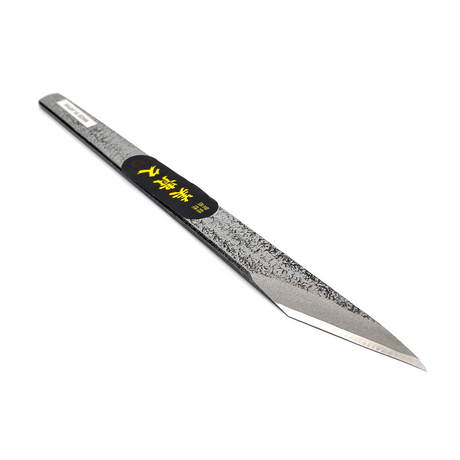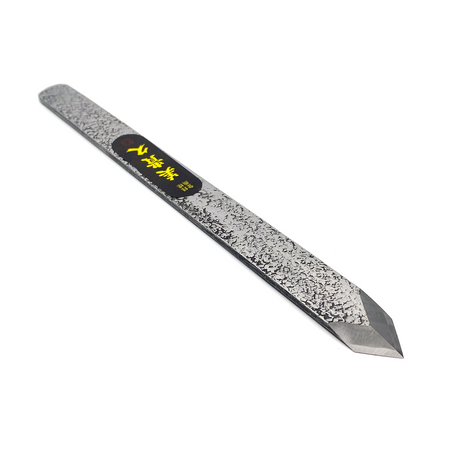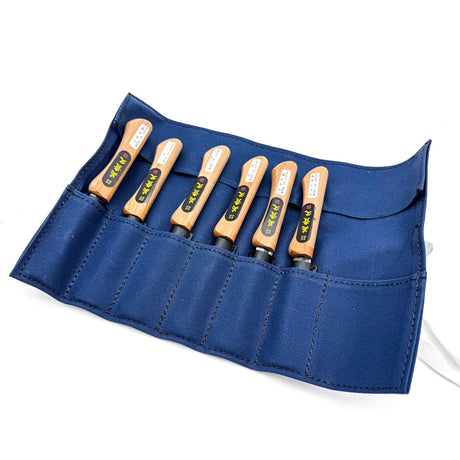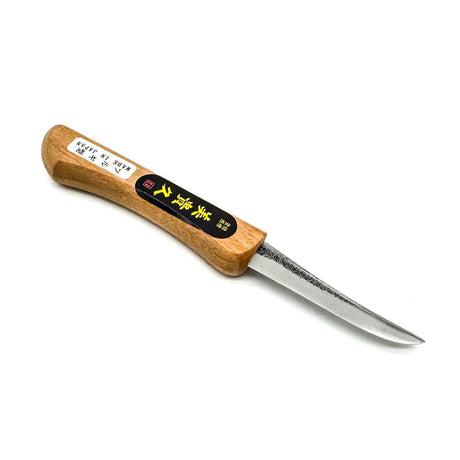Ikeuchi
Ikeuchi Kiridashi Kogatana Japanese Marking Knife Laminated High Carbon Steel
From $29.90$34.90Unit price /UnavailableIn stockIkeuchi
Ikeuchi Kensaki Shirabiki V Pointed Japanese Marking Knife 15mm
$33.90$39.90Unit price /UnavailableIn stockYoshiharu Hamono
Yoshiharu Hamono Wooden Handled Kiridashi Marking Knife
$12.90$14.90Unit price /UnavailableLow stock (6 units)Yoshiharu Hamono
Yoshiharu Hamono Brass Handled Kiridashi Marking Knife
$10.90$12.90Unit price /UnavailableIn stockNSB
Ikeuchi Mikikichan Set of 6 Carving Knives 160mm Long with Canvas Tool Roll for Woodcarving
$209.90$249.90Unit price /UnavailableLow stock (10 units)
Japanese Woodworking Knives: Precision and Tradition in Every Cut
Japanese woodworking knives are highly regarded for their precision, sharpness, and craftsmanship, making them indispensable tools for any woodworker. These knives, often forged by skilled artisans, combine traditional techniques with modern materials, resulting in tools that offer unmatched performance. Whether you're carving intricate details or making clean, precise cuts, Japanese knives are designed to deliver exceptional results with every use.
The blades of these knives are typically made from high-carbon steel, which is known for its ability to hold a sharp edge longer than many other types of steel. This allows woodworkers to achieve finer details and more consistent cuts, making them ideal for tasks such as marking, carving, and finishing. The ergonomic handles, often crafted from natural wood, provide a comfortable grip, ensuring control and precision during prolonged use.
Investing in a Japanese woodworking knife is not only about acquiring a tool but also embracing a piece of the rich history of Japanese craftsmanship. Each knife is a testament to the meticulous attention to detail and dedication to quality that has been passed down through generations of Japanese artisans. These knives are not just tools; they are an extension of the woodworker’s skill, enabling the creation of fine, intricate work.
Whether you are a professional woodworker or a hobbyist, the reliability and precision of Japanese knives can significantly enhance the quality of your work. With proper care and maintenance, these knives will serve you well for many years, making them a valuable addition to any woodworking shop.
FAQs
What makes Japanese woodworking knives different from Western knives?
Japanese woodworking knives are typically made from high-carbon steel, which retains a sharp edge longer than many Western knives. They also feature ergonomic handles and are often forged using traditional techniques, offering precision and control ideal for intricate woodworking tasks.
How should I maintain my Japanese woodworking knife?
To maintain your Japanese woodworking knife, regularly hone the blade with a fine sharpening stone and clean it after each use to prevent rust. Store the knife in a protective sheath or case to keep the edge sharp and avoid damage.
Are Japanese knives suitable for beginners?
Yes, Japanese knives can be used by beginners, but they are particularly appreciated by those who have developed some skill in woodworking. Their sharpness and precision make them excellent tools for learning and refining cutting techniques.
What types of tasks are Japanese knives best suited for?
Japanese woodworking knives are best suited for tasks that require precision, such as carving, marking, and fine finishing work. Their sharp edges allow for detailed and clean cuts, making them ideal for intricate woodworking projects.
Can Japanese knives be used on hardwoods?
Yes, Japanese knives can be used on hardwoods, but it's important to maintain the blade's sharpness through regular honing. The high-carbon steel blades are tough enough to handle hardwoods while providing the precision needed for detailed work.
What is the difference between a Kiridashi and a regular woodworking knife?
A Kiridashi is a traditional Japanese marking knife with a single bevel, used primarily for precise marking and scoring. Unlike regular woodworking knives, the Kiridashi's design allows for extremely accurate cuts, making it a preferred tool for detailed work.
Are Japanese knives hand-forged?
Many Japanese woodworking knives are hand-forged using traditional techniques, which involve hammering the steel to the desired shape and hardness. This process results in a blade that is both durable and capable of maintaining a sharp edge over extended use.
What are the common types of Japanese woodworking knives?
Common types of Japanese woodworking knives include Kiridashi knives for marking, Kogatana knives for fine carving, and various specialty knives for specific tasks such as detailed finishing and precision cuts. Each type is designed to meet the needs of specific woodworking applications.








